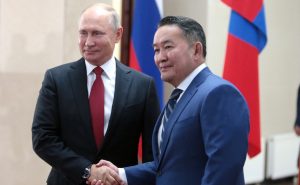In the 13th century, Kievan Rus, a medieval polity that covered most of modern-day Russia, Ukraine, and Belarus was invaded by the Mongols under the command of Jebe, one of Genghis Khan’s most trusted generals. Whilst the original Mongol invasion eventually subsided, a second wave of invaders, this time lead by Genghis Khan’s grandson, Jochi, sacked the territories of Russia. The period that followed is often described as the “Tatar Yoke,” an age when Russia was subjugated and became a vassal of the Mongols, including their powerful successor state, the Golden Horde.
Fortunately for Russia, its relationship with Mongolia in the 21st century is anything but medieval.
Russia has invited a military contingent from the Armed Forces of Mongolia to participate in its annual Victory Day parade, designed to commemorate the Soviet Union’s victory in World War II. The fact that Mongolia is participating is revealing for a number of reasons. First, a quick glance at the other nations involved shows almost all of them have close ties to Russian President Vladimir Putin and the Kremlin, including Armenia, Belarus, Serbia, and Uzbekistan. By attending, Mongolia is also included, symbolically at least, alongside some of Russia’s most enduring allies. Furthermore, Mongolia’s place in the parade also emphasises the respect and appreciation 21st century Russia has for Mongolia’s contribution during World War II, which included supplying the Soviet Union with money, raw materials, and military support.
Russia’s invitation should come as no surprise. Just last year, Putin visited the Mongolian capital Ulaanbaatar, where he signed a “permanent treaty of friendship” with his counterpart, Mongolian President Khaltmaagiin Battulga. At the time of the treaty, Putin stressed the importance of the “political, economic and cultural” relationship between the two states.
Trade relations have continued to strengthen between Mongolia and Russia. For the first nine months of 2019, Russia-Mongolia trade turnover was around $1.7 billion, up 13 percent over the previous year. In addition, Russian companies are also heavily involved in major infrastructure projects in Mongolia, including the potential upgrade of the Ulaanbaatar Railway.
But why is Moscow so keen to further its friendship with Ulaanbaatar? Despite impressive improvements in commerce, the financial value of trade between the two should be higher, particularly given the two share a border that is almost 3,500 kilometers long. Furthermore, Mongolia, famous for its rolling hills and grass steppes, is sparsely populated and has a population of just over 3 million people, meaning it is unlikely to become a major center for Russian goods. Analysts estimate that over 90 percent of Mongolia’s energy supplies come from Russia, and there is no denying Mongolia can serve as an important transit route for Russian energy to China, but this alone cannot explain the increasing importance of Mongolia to Putin’s Russia.
Numerous commentators, analysts, and writers have commented on Russia and China’s competing influences in Mongolia, and while this is certainly true, we need to look at Moscow’s wider regional policy to fully understand the relationship. Russia’s interest in Mongolia is part of a general trend toward greater engagement with the Central Asia region. Despite COVID-19 concerns, the leaders of four of the five Central Asian states will be attending the Victory Parade (the fifth, Turkmenistan’s Gurbanguly Berdymukhamedov, cancelled plans to attend). This is yet another public display designed to show Russia’s continuing engagement in Central Asia. Furthermore, aside from symbolic gestures and invitations to important commemorative events, Russia is also taking concrete actions to showcase its continuing power in the region. Last year, Uzbekistan announced its desire to purchase state-of-the-art military equipment from Russia, and just this week, Russia and Tajikistan were holding joint military drills in the mountains close to the Tajik capital, Dushanbe. Moscow’s attempts to court favour with Ulaanbaatar needs to be viewed against this wider context, of Russia’s bid to maintain its influence in the old Soviet sphere.
But this still begs the question, are Russia’s attempts to bolster its relationship with the region solely aimed at countering Chinese influence? This argument too simplistic and ignores the role of other powers. Moscow’s strategy in Central Asia and Mongolia isn’t only aimed at China, but other regional rivals.
Turkey, for instance, has a historic relationship with the region. After the successor states to the Mongols were gradually defeated by the Russian Tsar Ivan the Terrible in the 16th century, the Ottoman Turks continued to support their fellow “Turkic Mongol brothers” in their fight against Russia. Recently, Turkey has been active in “soft power” diplomacy in the area, including working with Mongolian companies to produce masks and other medical equipment and building a 250-tonne capacity warehouse to help Mongolian farmers. Turkey and Russia have a complex relationship, and the fact they support different sides in both the Syria and Libyan conflict has done little to bridge the gap between these two regional and historical rivals.
Furthermore, Putin will be acutely aware of the United States’ attempts to court favour with Mongolia. Washington recently reaffirmed Mongolia as “an important Indo-Pacific Partner,” and both have signed a “shared commitment to freedom, democracy and human rights.” Therefore, Russia’s relationship with Mongolia is about more than countering Chinese influence in the region. It must be viewed against the backdrop of Russia’s wider regional policy and its attempts to deter other rivals, including Turkey and the United States, from gaining a regional foothold.
Russia needs a positive relationship with its southern neighbor now more than ever, because if Mongolia sours on Russia, there are others waiting to take its place.
Shahid Hussain will soon start Ph.D. research at University College London (UCL) in Anglo-Russian diplomacy in the 17th century. He completed undergraduate and master’s degree at UCL, focused on Russia’s relationship with the Islamic world.
































